
Cochrane Gynaecology and Fertility (CGF) 2018 Highlights
As 2018 is coming to an end, we would like to look back on a very special year and share some of CGF achievements with you. We would like to take this opportunity and thank all our authors, reviewers, editors, readers, translators, and members of our community, for their continuous support. We would not have had such a successful year without you!
We wish you a happy new year!
What did we accomplish in 2018?
CGF Satellite
In January, CGF established a Satellite group based in the Centre for Reproductive Medicine in Amsterdam UMC, University of Amsterdam, the Netherlands. The satellite started off with reviews on the effectiveness and safety of interventions in subfertile women undergoing intrauterine insemination and in women with polycystic ovary syndrome. Later during the year, the satellite took over editorial responsibility for over a dozen titles on laboratory methods in assisted reproductive technology. The satellite recently started handling all reviews focusing on interventions for endometriosis.
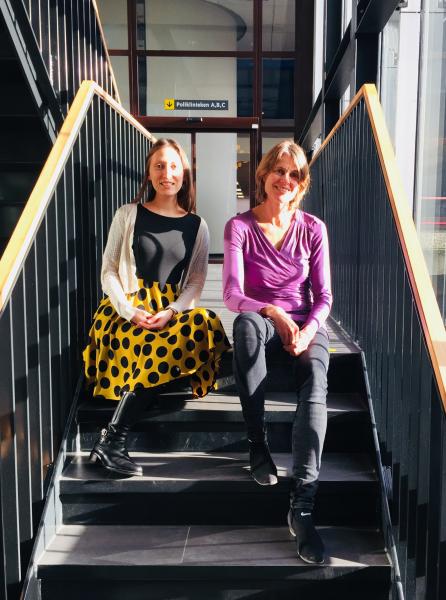
Cochrane Gynaecology and Fertility Satellite in the Netherlands; Dr Madelon van Wely and Dr Elena Kostova (right to left).
Our Evidence
In 2018, CGF published 5 protocols, 6 new reviews, and 15 updates, making a total of 26 publications!
See below the full list with links to the Cochrane Library.
Protocols
- Day 5 versus day 3 embryo biopsy for preimplantation genetic testing for monogenic/single gene defects
- Endometrial injection of embryo culture supernatant for subfertile women in assisted reproduction
- Granulocyte‐colony stimulating factor administration for subfertile women undergoing assisted reproduction
- Interventions for the treatment of heavy menstrual bleeding
- Vitamin or mineral supplements for premenstrual syndrome
New Reviews
- Application of seminal plasma to female genital tract prior to embryo transfer in assisted reproductive technology cycles (IVF, ICSI and frozen embryo transfer)
- Individualised gonadotropin dose selection using markers of ovarian reserve for women undergoing in vitro fertilisation plus intracytoplasmic sperm injection (IVF/ICSI)
- Inositol for subfertile women with polycystic ovary syndrome
- Perioperative interventions in pelvic organ prolapse surgery
- Surgery for women with pelvic organ prolapse with or without stress urinary incontinence
- Surgery for women with posterior compartment prolapse
Updated Reviews
- Acupuncture and acupressure for premenstrual syndrome
- Antifibrinolytics for heavy menstrual bleeding
- Aromatase inhibitors (letrozole) for subfertile women with polycystic ovary syndrome
- Assisted reproductive technology: an overview of Cochrane Reviews
- Follicular flushing during oocyte retrieval in assisted reproductive techniques
- Hysteroscopy for treating subfertility associated with suspected major uterine cavity abnormalities
- Intrauterine administration of human chorionic gonadotropin (hCG) for subfertile women undergoing assisted reproduction
- Intrauterine insemination versus intracervical insemination in donor sperm treatment
- In vitro maturation in subfertile women with polycystic ovarian syndrome undergoing assisted reproduction
- Metabolomics for improving pregnancy outcomes in women undergoing assisted reproductive technologies
- Oral contraceptives for pain associated with endometriosis
- Oral and intrauterine progestogens for atypical endometrial hyperplasia
- Pain relief for women undergoing oocyte retrieval for assisted reproduction
- Time‐lapse systems for embryo incubation and assessment in assisted reproduction
- Vasodilators for women undergoing fertility treatment
Impact and Knowledge Translation
Two of our reviews published in 2018 are among the top 3% best-cited reviews in the Cochrane Library for Systematic Reviews (CDSR) for 2018 ("Aromatase inhibitors (letrozole) for subfertile women with polycystic ovary syndrome" and "Oral contraceptives for pain associated with endometriosis" with 14 and 13 citations respectively).
When the Cochrane Library impact and usage data for 2017 was released earlier this year, we were very excited to see that Cochrane Gynaecology and Fertility group impact factor had increased to 9.155!
2018 was also the year that we became more active on social media. Not only did our followers grow by 30%, our posts reached 87,000 members of the community. Our tweets focused on disseminating newly published evidence and sharing interesting news in the field of gynaecology, fertility, and embryology, as well as awareness campaigns, such as the Polycystic Ovary Syndrome (PCOS) Awareness Month campaign in September and the Menopause Awareness Day campaign on October 18. This year we also started developing blogshots as means of delivering published Cochrane evidence to a bigger audience.
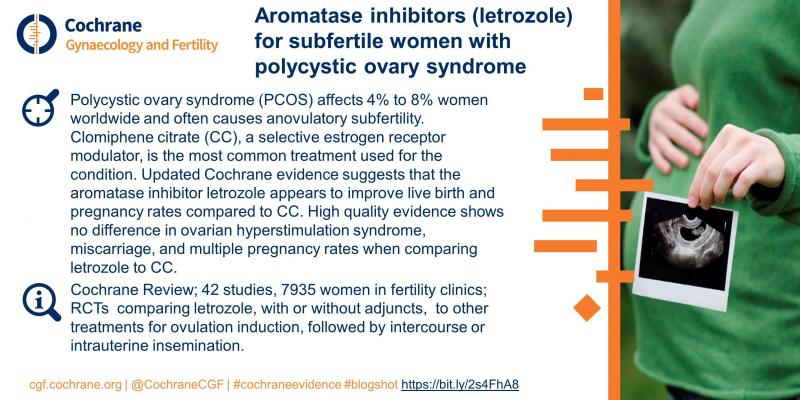
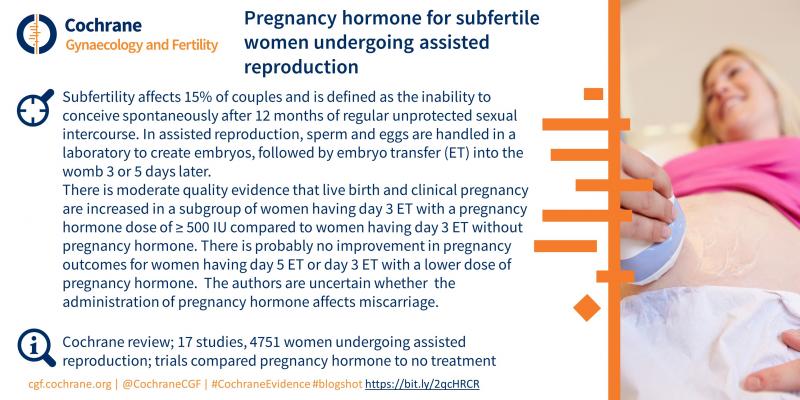
We are committed to making our evidence more accessible and we look forward to implementing various elements of the knowledge translation framework into our work, such as the Cochrane-Wikipedia initiative and infographics.
Meetings
We set our own booth up at the ESHRE 2018 Congress in Barcelona and we hosted two Cochrane Gynaecology and Fertility Meetings (one at ESHRE and one at the Cochrane Colloquium in Edinburgh). These were all great opportunities to meet and connect with many of our authors, editors, and reviewers.
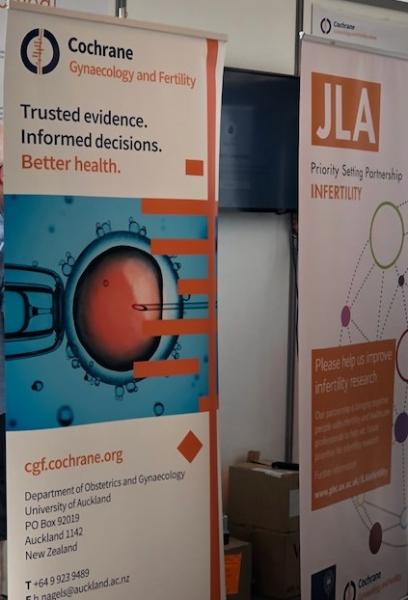
CGF booth at ESHRE, 1-4 July 2018, Barcelona, Spain
COMMIT
The COMMIT (Core Outcome Measures for Infertility Trials) working group met in Auckland in November this year. 70 participants from 22 countries joined the discussions about the development of core outcomes for endometriosis, core outcome measures for infertility trials, IVF trial extension COMMIT-IVF, and research priorities for patients with infertility. The outcomes of the meeting are being prepared at the moment and will be published in a peer-reviewed journal earlier next year.
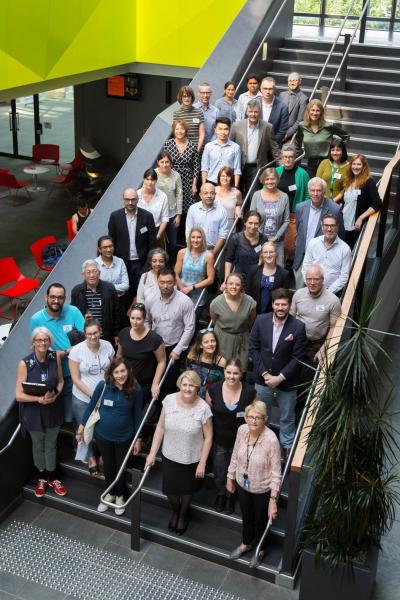
COMMIT meeting, 28-30 November 2018, University of Auckland, New Zealand
Editorial
We established a new peer review policy in accordance with Cochrane’s requirements introduced earlier this year. The policy focuses on open peer review and peer review acknowledgement. Find out more here. We are regularly updating our guideline documents with the latest tips and instructions on how to write an excellent systematic review, so visit our resources page regularly. Finally, here a couple of interesting developments to look forward to in 2019 – these include getting to know RevMan Web and the new Risk of Bias tool 2.0 We are also going to integrate updating classification system (UCS) to all our updates on the Cochrane Library. UCS will enable readers to track the status of each update, including expected publication date.
We have plenty of reviews in our pipeline for 2019 and we cannot wait to share the evidence with you!
Join us for very exciting year ahead!

With best wishes,
Prof Cindy Farquhar, Dr Madelon van Wely, Helen Nagels, Dr Elena Kostova, and Marian Showell
